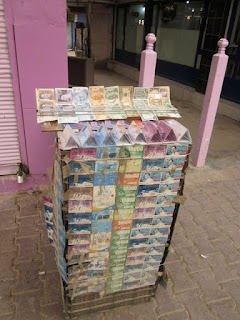The entrance to our house/office in Suleimaniya.
I imagine that some of you don't really know what we do here. You may wonder what I do all day when I am in Kurdish Northern Iraq for 3 months- away from the blizzards and floods of southern Manitoba. So here is a few glimpses of team life in Suleymaniya, Kurdish Northern Iraq. Right now things are a little slow. The active anti-corruption protests are squashed for now and the leaders are processing where to go next, we are waiting for the mayor in the mountain region to give us an appointment to explain to him why we should be allowed to live up in the village for several months this summer, and we are waiting for meetings with UN officials re our Iranian refugee interviewing project. Life seems to be quite a bit of waiting right now.
7:30 am My alarm goes off and I do a bit of yoga to loosen up, eat breakfast (yes, we can buy Kellog's Raisan Bran and peanut butter here), and get ready for worship and team meeting. Right now there are 5 of us on team and we have a daily rota: leading worship and team meeting, cooking supper, washing all the dishes for the day and writing the daily events log. The fifth person has a day off from chores.
Another morning team meeting. I think that this one was a short one. Clockwise: Lukasz (from Czech Republic), Peggy (from Ohio, USA), Michele (Minnesota, USA) and Chihchun (from Taiwan) and of course me from Manitoba, Canada.
8:30 All 5of us gather for worship. Right now people on team are quite punctual for this deadline. Worship time varies from more liturgical worship to watching videos or listening to songs or complete silence. It usually lasts for around 1/2 hour. Right afterward we write down agenda items and discuss the plans for the day and anything that needs to be reported or discussed. This meeting can take anywhere from 10 minutes to 2 hours depending on the intensity of things to be discussed and whether something needs a consensus decision.
10:00ish to 1:00ish We may work on writing that needs to be done or go to meetings with partners or study Kurdish in preparation for the 3 hours class (this is only for Lukasz who is taking private lessons right now).
Some days people come to our office/house for meetings ( or like today, they don't show up and we don't know why!). Mohammed, our translator and friend comes most mornings to make phone calls to non-English speakers or to drive us to appointments at other offices. We are pleased to hear that our application to stay here for another year as a NGO has been accepted. Whew!
Mohammed, our translator, driver, advisor and very good friend. I hope to make a whole blog post about him soon.
1:00ish to 3:00ish We all prepare separate lunches. Some of us eat more of a brunch earlier.
3:00-6:00 More of the same can happen. Meetings, phone calls, writing. I often go shopping for household items and bulk food at the larger grocery store, Taj, which is a 10 minute walk away. (Fruits and veg are bought at our local shop which is just around the corner). My permanent job is taking care of household buying. Other jobs are team co-ordinator, finances, technology and keeping track of written releases and updates. I sometimes take the 15 minutes bus ride to the city centre to the bazaar where one can find almost anything. If I am out on team business, I can take a few minutes to buy more personal things (like Birkenstock sandals at the used shoe stalls).
This picture references an earlier post about the lack of stealing. Note the bills attached to the top of the stand and all the phone cards underneath.
The young salesmen at one of the many used shoe shops at the bazaar. They are standing in front of the "ladies shoes" that they thought that I should buy as well as the pair of Birkenstock sandals.
6:00-7:00 This is supper time. Each of us have our favourite things to make and some repetoires are more extensive than others, but mostly the food is really good. I will have to adjust to having to cook supper most every night when I get home.
7:00-? Evening creates a time for more personal pursuits. Some writing is done and skyping with friends and family. One evening a week we have a team-building night where we play a game or watch a movie or other such fun pursuits. Others of us just have a nap. Here is a photo of our other team member, Lulu. She is 2 years old and is our mascot. She is showing what a CPTer does when one is really relaxed after a hard day.
Playing a German board game.
This is the ultimate in CPT self care.















